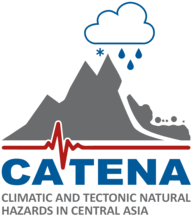CaTeNA – Climatic and Tectonic Natural Hazards in Central Asia

CaTeNA is a project within the CLIENT II program of the Federal Ministry of Education and Research (BMBF). Central Asia is one of the tectonically most active regions on earth. It is influenced by two major climate systems, the Westerlies and the Monsoon. CaTeNA investigates the two major natural hazards that occur under these conditions: earthquakes and mass movements. The sub-project in Sections 4.1 and 2.4 investigates the current deformation field in the Pamir using seismological (Figure 1) and space-geodetic data (GPS and InSAR).

Figure 1: The region of investigation with the temporary seismic network in the eastern Pamir of Tajikistan and China. This network recorded the three large earthquakes pictured as beachballs. Earlier seismic networks are depicted as grey triangles.
Coordinator: Bernd Schurr (Section 4.1)
PIs: Bernd Schurr (Section 4.1), Sabrina Metzger (Section 4.1), Xiaohui Yuan (Section 2.4)
PostDoc: Wasja Bloch (Section 4.1)
Funding: BMBF 03G0878A, GFZ expedition fund
Project duration: 2017-2020
Partner: Institute of Tibetan Plateau Research of the Chinese Academy of Sciences (ITPCAS), Institute of Geology, Earthquake Engineering and Seismology of the Academy Science of the Republic of Tajikistan, Dushanbe, Universität Potsdam, TU Bergakademie Freiberg, Freiberg, Germany, Universität Tübingen, TU Berlin



